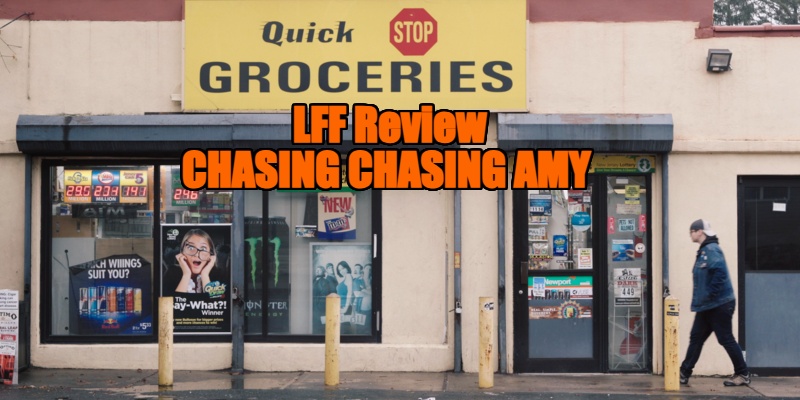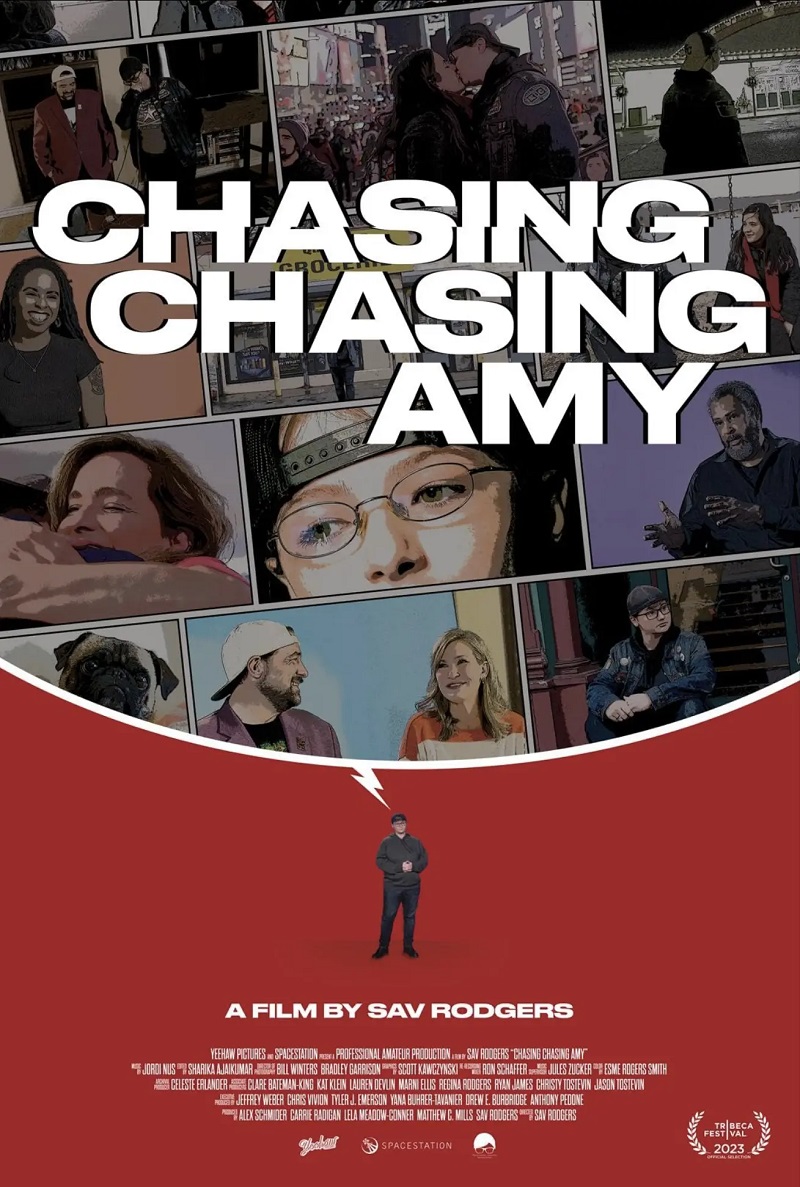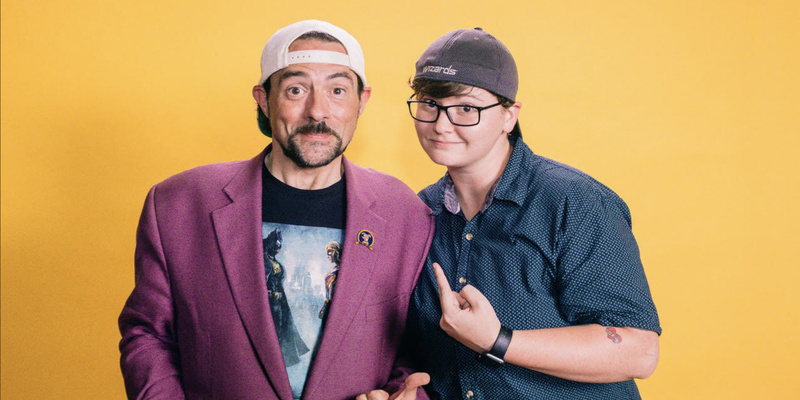
Review by
Benjamin Poole
Directed by: Sav Rodgers
Featuring: Kevin Smith, Guinevere Turner, Joey Lauren Adams, Scott Mosier, Sav
Rodgers, Andrew Ahn, Kevin Willmott

It's always embarrassing looking back. Finding an old CD in your attic of
a band that you'd never knowingly listen to now, someone reminding you of
a mad opinion you held way back when, bygone diaries which focus
obsessively on people you can barely remember today: what were you like,
eh? I'm here to say, embrace the awkwardness! The discomfort means that
life has moved on, and you along with it: "growth," as they say.
Kevin Smith gets it. In the opening of
Chasing Chasing Amy, Sav Rodgers' fan documentary about the phenomena of said '90s
indie flick, he has the genuine grace to remark in wonder that the
documentarian is still "saying good things about
Chasing Amy in 2020"-!
Like Wu-Tang, Movie Waffler is for the kids, so here's a quick
primer/reminder. 1997's Chasing Amy was the third film by
indie-filmmaker Kevin Smith, a romantic comedy with sociological ambitions
which was seen as a return to form following Smith's disastrous second
film (and let's not forget that debut Clerks was incendiary
- I mean, not as an evergreen film, nobody could sit through it now, but
as a triumph of creativity, determination and showing what could be done
if you were hard working and focussed and wanted it enough). It focused on
Ben Affleck being in a relationship with an ostensibly sort-of-gay woman
whose sexual history turns out to surpass his, and he gets angry about it.
Controversial at the time and since for its supposedly cavalier LGBTQ+
portrayals, FWIW this is my take on the film: I still find it an
uncomfortable watch, but for the right reasons, i.e., its unflinching
portrayal of cringe inducingly recognisable male insecurity and
entitlement, which the film criticises. Yes, Chasing Amy is
clumsy, but not hateful, and as adults we should perhaps understand that
representation is not always endorsement or intended as a universal
statement. Today, where we have lots of gay characters whose sexuality is
incidental and not a driving aspect of the plot (like Jasmin Savoy Brown
in the new Screams, a franchise which Kevin Smith once starred in, say),
it's easy to forget how rare the portrayals in Chasing Amy, of gay characters that are relatively detailed and sympathetic, must
have been.

It was certainly a big deal for Rodgers, who, as a child Ben Affleck
fanatic (!), happened upon a VHS of said film. An adolescent coming to
terms with their sexuality, for Rodgers the film was both a revelation and
a balm (and further proof that when all is said and done the film probably
did more good than harm). Chasing Amy had such an effect on
Rodgers that he went and made a stirring Ted Talk about the film. Smith
himself, God bless him, reached out to Rodgers (as did Affleck, fair
play), a contact which set in motion this documentary, which extends the
Ted Talk into an exploration of the film and also, mainly, explores the
lasting impression it had on the Generation Z Rodgers.
The access Rodgers achieves is impressive. Chiefly, there is Smith
himself, who as ever comes across as an earnest, sentimental and cuddly
old stoner (I like him, so what) full of love and encouragement for fans.
Chipping in are film critics (my invite got lost in post, etc), other
filmmakers, and stars of the film. Sadly, no Affleck (whose star persona
of privileged, strong jawed basic bros, often knowingly portrayed like in
Gone Girl or Batman v Superman: Dawn of Justice, was cemented in Chasing Amy and it would have been
interesting to hear his take), but we do get Joey Lauren Adams (and
how!).
More contentious analyses of Chasing Amy are led by
Guinevere Turner, writer/star of Go Fish, an objectively better film than the similarly humble and monochrome
Clerks (serendipitously, I mentioned
Go Fish the other week in my
Fremont
review: consistency). Go Fish and Clerks were
on the same festival circuit, and the young filmmakers behind both
breakout films bonded and hung out, with Smith, it is implied, developing
a curiosity about Turner's sexuality and Clerks producer
Scott Mosier's crush on her: the scene in Chasing Amy about
how to define lesbian sex is, according to Turner, a previous conversation
lifted verbatim from this era. The disputation, which reviews from 1997
openly accuse the film of, is that the film plays to the "straight white
community" and packages LGBTQ+ characters for that audience, a defining
aspect of the film not helped by the manner in which Alyssa helplessly
denounces her God given gayness for straight bloke Holden.

Is it worth getting het up about the out-of-date ideologies of a film from
over a quarter of a century ago? Perhaps not. And so, in order to lend
weight to the film, the documentary is correlated with Rodgers' decision
to come out as trans, and the ongoing relationship with his girlfriend. A
side note: it's not for me to stereotype, but in firm opposition to the
Helen Joyce vile school of transphobia, it seems clear to me that Rodgers,
a female to male transexual, was obviously male all along. He obsesses
over minutiae of pop culture specific to him, he forces his interests and
totem texts onto his partner and, most tellingly, to him all of this
Really Matters. This is what men do. Mind you, not all of us make
documentaries about it, but we are prone to posting rambling social media
diatribes/film reviews. Sav just goes that bit further.
I'm all for young love and people getting together, but, and apologies,
when all is said and done it is quite the quotidian phenomenon and not
necessarily the stuff of feature documentaries. Could this be a
generational fashion, a Gen Z urge to record and broadcast something just
because it is happening to them? It's sweet and lovely, but, yeah, so
what? (Perhaps it is a bit coercive, too, that Rodgers asks his partner,
an absolute darling, to marry him on camera. So intimate...). More
interesting is Rodgers coming out and, as the film is put together over
the succeeding months, his developing transition. Inspiringly, Rodgers'
transition is presented as uncomplicated, in the sense that people are
universally accepting, and Rodgers is excited at the process and visibly
happier and more comfortable in himself at the end of the film. And it's
all thanks to Kevin Smith and his muddled attempts to forge a constructed
narrative out of Joey Lauren Adams' intimidating sexual history (not
really, but I suppose the association implies a causality). Good for him.
The most interesting aspect of Chasing Chasing Amy however,
and the reason I recommend this film, is the presence of the astounding
Joey Laurence Adams. What a woman. We first meet her in a joint interview
with Smith, with the filmmaker being cutely apologetic for the manner in
which Alyssa is constructed (he is open about the film essentially being a
treatise on the then romantic relationship between him and Adams), where
Adams smiles along gamely but with a definite reluctance in her body
language. Because the imperial Miramax era will forever be tainted by its
association with the studio head, a convicted rapist and repudious emblem
of the time's patriarchal toxicity, which bro-centric films like
Chasing Amy were, like it or lump it, a product of...

And thus, when she is interviewed herself, Joey Lauren Adams goes IN on
Chasing Amy, in on Kevin Smith, in on the film industry and, yikes, even in on
little Sav himself. She questions why he is so hung up on the film, why he
even wants to talk to her, and articulates a "weird energy exchange"
between them. It is devastating and also a blunt meta-veto of fan
fixation. It's a little unfair to the kid, really, but it is utterly
riveting in the same way that violence is (when Adams asks what Sav wants
from her he heartbreakingly replies, "I dunno, perhaps we can be
friends"). Adams broadens her invective towards the industry which treated
her like a "piece of meat" and a "whore." It is an invigoratingly
discomfiting revelation of the real-life sexual exploitation occurring
beyond the risqué confines of Smith's films and neither the documentary
nor the documentarian quite recovers from it.
Context is everything, and it is impossible to imagine
Chasing Amy "as is" made today. It is a film made then, in direct opposition to
Chasing Chasing Amy which is, with a genesis dependent upon
social and viral media and its involuntary examination of the sort of fan
culture which Kevin Smith films catalysed, a film that could only be made
now. Watching the documentary with its throw-back clips to the '90s, it is
bittersweet to see Smith, initially an iconoclastic independent filmmaker,
with his career now so dependent on nostalgia and regurgitating various
reiterations of those earlier films (the last one I saw featured someone
having sex with a donkey, so I'm unsure if the subsequent entries into the
canon have the same social relevance as Chasing Amy. Update - I texted a mate of mine who is a fan, and he says that Smith's
He-Man Netflix show has a progressive ideology - thanks Adam). Is it
possible that a director newly minted would still inspire such a fervent
fan following? To misquote a song from that era featuring yet another sex
abuser: my heart hopes so, but my mind is telling me no. Perhaps the most
poignant aspect of Chasing Chasing Amy is how the
documentary itself is a hark back to a time when films and filmmakers were
seen as special and exciting, a time when movies did actually matter to
people.


